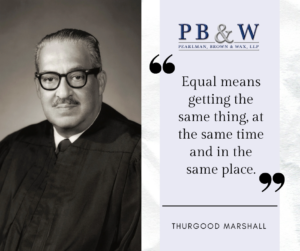March 1, 2022
In culmination of Black History Month, Pearlman, Brown & Wax, LLP is proud to honor the legacy of Thurgood Marshall. As a civil rights activist, lawyer and the first African-American justice of the Supreme Court of the United States, Marshall not only inspired future generations of lawyers and jurists of all races, ethnicities, nationalities, socioeconomic backgrounds and creeds, he strengthened a nation with legal efforts that bettered the lives of all Americans.
Without his tremendous success at dismantling racial stereotypes by proving that he was just as intelligent, capable, and deserving as his white peers of the honor bestowed upon him as a justice of the Supreme Court, there arguably would be no Associate Justice Clarence Thomas, Associate Justice Sonia Sotomayor, and potentially, Associate Justice Ketanji Brown Jackson. Without his dedication to ending racial segregation, educational and other opportunities would not have been afforded to all our citizens.
May this trailblazing jurist’s words and wisdom rouse our legal community now and in the future to fight against complacency, and to always strive for excellence as we serve the legal needs of our valued clients and our communities.
Building Skills for a Legal Future
Marshall, a descendant of slaves, was born in Baltimore, Maryland, in 1908. At a young age, he began learning the skills that would serve him well in his legal career. He learned the art of debate from his father, who took Marshall and his brother to watch court cases; they would later debate what they had seen. Marshall’s father challenged his sons on the points they made, constantly encouraging them to prove their case.
After high school, Marshall attended Lincoln University, a historically black college, where he graduated as a top-notch student with a bachelor’s in American literature and philosophy. Law school came next. While he wanted to study at the University of Maryland School of Law in his hometown, he didn’t apply because of the school’s policy of segregation. Consequently, he matriculated to Howard University Law School, graduating as valedictorian of his class in 1933.
Rising to Success
Following law school, Marshall started his own practice in east Baltimore. He also began his 25-year affiliation with the National Association for the Advancement of Colored People (NAACP) in 1934, when he represented the organization in the law school discrimination suit, Murray v. Pearson. Two years later, he became part of the national staff of the NAACP, and by 1940, the face of the organization had become that of Marshall’s. There, he was able to work toward his goal of challenging segregation in education. In fact, in a case that was filed against the University of Maryland Law School, he meticulously and successfully argued that Maryland’s segregation policy violated the “separate but equal” doctrine of Plessy v. Ferguson.
Indeed, Marshall won a series of court decisions that gradually struck down that doctrine, ultimately leading to the landmark case, Brown v. Board of Education, which Marshall argued in 1952 and 1953. After 5 months of waiting, the Supreme Court delivered its opinion that invalidated the separate but equal doctrine.
In 1961, President Kennedy nominated Marshall to the U.S. Court of Appeals for the 2nd Circuit. While there, he wrote 112 opinions, none of which were overturned on appeal. President Johnson called upon Marshall in 1965 to be the country’s next Solicitor General and the first African American to hold the office.
Doing the Right Thing
In 1967, President Johnson nominated Marshall as an associate justice of the Supreme Court of the United States. In his nomination Johnson said it was, “The right thing to do, the right time to do it, the right man and the right place.”
Marshall served on the Court until 1991, compiling a liberal record that included strong support for Constitutional protection of individual rights. He was succeeded by Associate Justice Clarence Thomas. Marshall died on January 24, 1993, of heart failure in Bethesda, Maryland, leaving a lifelong legacy that continues to resound to this day.

